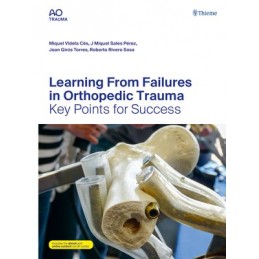- Obniżka


 Dostawa
Dostawa
Wybierz Paczkomat Inpost, Orlen Paczkę, DHL, DPD, Pocztę, email (dla ebooków). Kliknij po więcej
 Płatność
Płatność
Zapłać szybkim przelewem, kartą płatniczą lub za pobraniem. Kliknij po więcej szczegółów
 Zwroty
Zwroty
Jeżeli jesteś konsumentem możesz zwrócić towar w ciągu 14 dni*. Kliknij po więcej szczegółów
Numerous advances in basic research, surgical techniques, practice, and patient care have revolutionized surgery over the last 60 years and made the field with its many subspecialties more diverse but also more complex.
The surgical profession places high demands on surgeons who must often make the right split-second decisions. This can easily lead to misjudgments or mistakes.
Learning From Failures in Orthopedic Trauma—Key Points for Success is the first book of its kind to give surgeons the opportunity to learn from failures without making them themselves.
Based on the Spanish book Errores en la Osteosíntesis by Rafael Orozco Delclos, this publication offers real case examples that have been collected over the past 25 years. It is an essential and valuable resource as it specifically examines the reasons and responses to surgical error in real cases from different anatomical regions of the body, thus helping surgeons avoid the most frequent errors in osteosynthesis.
The collection of more than 70 cases will help surgeons recognize and avoid common failures, start reflecting in action, present failures as positive learning opportunities, and bring that knowledge into their daily practice.
The book is divided into 9 sections that analyze different types of failures. Key features are::
Opis
Section 1—Introduction to internal fixation
1.1 The evolution of internal fixation over the last 20 years
Section 2—Breaches of AO principles
2.1 General considerations on violation of AO principles
2.2 Osteosynthesis in unreduced fractures
2.3 Principles of stability, selection of implants, and the combination of absolute and relative stability
2.4 Biology management (including soft-tissue management)
Section 3—Implant-related issues
3.1 Implant selection issues
3.2 Type of implant related to biomechanical principles
3.3 Implant size, prebending, molding, and shape adapted to the fractured bone
3.4 Anatomical implants: ready-to-wear versus custom-fit
3.5 Designs and techniques of intramedullary nailing
3.6 Failures due to guided targeting and implant assembly
Section 4—Surgical team
4.1 Determining factors for failures relating to the surgical team
4.2 Insufficient preparatory planning, including alternatives
4.3 Lack of anatomical knowledge
4.4 Insufficient asepsis protocols
4.5 Proficiency and experience
4.6 Accumulation of failures
Section 5—Postoperative management
5.1 General considerations in postoperative management of internal fixation
5.2 Physiotherapy
5.3 Implant removal
Section 6—Patient compliance
6.1 Failures unrelated to the healthcare team but related to patient compliance
Section 7—Failure recognition and timing
7.1 Early recognition of failures
Section 8—The learning circle
8.1 The learning circle: tips and tricks to minimize failures
Section 9—Bizarre failures
9.1 Difficult to classify
Appendix
